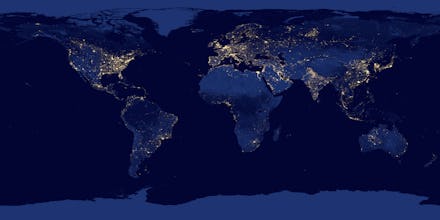Scientists Say We're About to Enter a New Epoch in Human History

The news: Scientists are gathering in Berlin, Germany today to debate whether humanity's impact on the planet (think global warming) is drastic enough to merit a new name that will mark the reign of humans: the Anthropocene.
The interdisciplinary body of 30 scientists, called the Anthropocene Working Group, has a self-imposed deadline, 2016, to submit a formal proposal that would make the Anthropocene an official unit in the Geological Time Scale.
If the proposal is approved, the Anthropocene could end 11,700 years of our current Holocene epoch.
The term, which was coined in 2000 by the Nobel laureate and atmospheric chemist, Paul Crutzen, has in recent years become a buzzword in science circles and now quickly entering the mainstream lexicon.
Though it's an eye-catching word, says writer Joseph Stromberg in Smithsonian magazine, many stratigraphers, scientists who study rock layers, are skeptical.
"When you start naming geologic-time terms, you need to define what exactly the boundary is, where it appears in the rock strata," Whitney Autin, a stratigrapher at the SUNY College of Brockport, told Smithsonian. The potentially new time period, Autin suggested, veers towards pop culture rather hard science.
This handout image taken in 2012 and provided by NASA is called the "Age of Human." People are changing the world with global warming and pollution so much that scientists are turning to a new way to describe the time we live in.
The takeaway: Debates aside, the Anthropocene also reflects how we are overexploiting the planet's resources, a collision now manifest in severe droughts, intensifying storms and rising sea level.
In her book, the Sixth Extinction: An Unnatural History, author and staff writer for the New Yorker Elizabeth Kolbert described her work documenting the causes of five mass extinctions.
In the last chapter, she tells the story of a Hawaiian crow named Kinohi. The bird was one of about a hundred left on the planet and a nearby breeding facility needed his genetic material. But Kinohi refused to mate. As the theory goes, he did not see himself as a bird because he was raised by humans.
The scientists took him to a veterinary clinic in San Diego Zoo where reproductive physiologist Barbara Durran attempted to extract genetic material.
"That story seemed to bring together all these qualities of being human," Kolbert told National Geographic.
"It's about people's amazing resourcefulness and concern, about people making more and more heroic efforts to try to save pieces of the natural world—and meanwhile it continues to be under greater and greater assault."